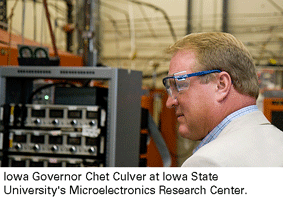 During a tour of renewable energy projects in the state, Iowa Governor Chet Culver stopped by Iowa State University on August 5 to learn more about the university’s research projects supported by the Iowa Power Fund.
During a tour of renewable energy projects in the state, Iowa Governor Chet Culver stopped by Iowa State University on August 5 to learn more about the university’s research projects supported by the Iowa Power Fund.
Vikram Dalal, Thomas M. Whitney Professor of Electrical and Computer Engineering, is leading one of two Iowa Power Fund projects on campus. Governor Culver visited Dalal’s labs at the Microelectronics Research Center, learning about how researchers are working to increase the efficiency of thin film solar cells for homes and buildings.
State programs like the Iowa Power Fund help Dalal and others push their projects forward and gain support from other sources. In six months, Dalal has more than doubled the $1.69 million the state provided him, and he continues gaining support from interested organizations.
Researchers on the other campus project, led by mechanical engineering assistant professor Song-Charng Kong, are developing a new, low-emissions burner and a new catalyst for ethanol production to produce clean, renewable energy.
Supporting these projects is important for the state to advance its position as a leader in using renewable resources, according to Culver. “It allows Iowa to get on the national and international map, because we all know that research and development, commercialization, small business development, and entrepreneurship is really how we’re going to solve our short-term and long-term energy challenges,” he said.
The state has invested in 25 other renewable energy projects across Iowa. “Our dream is to create the silicon prairie of the Midwest here in Iowa,” Culver said.
At the governor’s visit, Sharron Quisenberry, Iowa State’s vice president for research and economic development, highlighted the university’s leadership in biorenewables research, noting the work involves all seven colleges on campus, with more than 160 faculty as well as graduate and undergraduate students contributing to projects.
She also discussed the state of Iowa’s plans to compete for a $20 million grant from the National Science Foundation. The funding would support collaborative research among the state’s three regent universities, as well as the other higher education institutions, state agencies, and industry.
The five-year grant, through the Experimental Program to Stimulate Competitive Research (EPSCoR) project, is specifically designed to build research capacity and stimulate competitive research. If the state receives the award, the new research collaborations will focus on wind, solar, and bioenergy. Additionally, the projects will encourage minorities and women to become involved, ultimately expanding the diversity and number of Iowa’s young people entering jobs in science, technology, engineering, and mathematics. “We’re going to make a difference,” Quisenberry said. “And we’re going to make a difference because we’re partnering together.”
